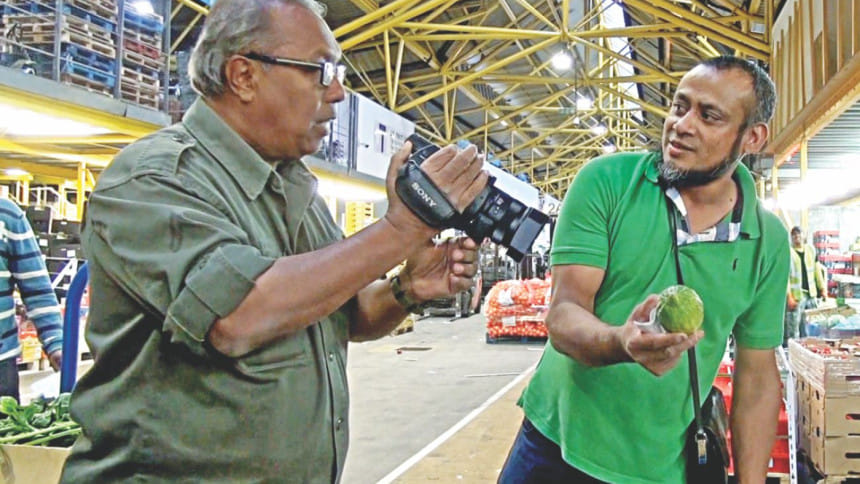Bangladeshi agro-products fall behind in UK market

In 2013, I went to one of the largest agro-product wholesale markets in Birmingham, UK. I was fascinated to see the huge quantities of agricultural products coming from different countries to the market. What was not there! Hog plum, guava, watermelon, mango, lemon, cauliflower, pumpkin, eggplants, snake gourd, coriander leaves, spinach and many more. Unfortunately, I did not find any product from Bangladesh in the entire market. Hog plum, guava and watermelon went there from Thailand, gourd and pumpkin from Italy, lemon from Egypt, eggplant from the Dominican Republic and onion leaves from Mexico. I was very shocked not to find any of our crops. But there were agricultural products from many under-developed countries of the world.
When I went to Malaysia in 2006, I saw pineapple being exported to Europe and Middle East markets from Johor Bahru after due processing. I also saw mint leaves being exported to the international market from Uganda. Despite the astounding success of Bangladesh in agriculture, why aren't Bangladeshi products able to enter this large foreign wholesale market? What I found while looking for answers really frustrated me. Bangladesh's agricultural exporters are unable to follow the standards set by the Department for Environment, Food and Rural Affairs (DEFRA) of UK government.
Then I visited the ethnic markets of UK. Particularly, I visited the local ones where expatriate Bangladeshis mostly go. There seemed to be a great demand for Bangladeshi agricultural products. The vendors of those markets used to take agriculture products from Bangladesh and sell those there on their own. We had quite a big market in our possession. But certified standard of DEFRA came in the way of importing from there. Among those products, there were mainly lemons, different vegetables and betel leaf. To overcome the barriers, a programme was also organized by the Department of Agriculture Extension in our country for quality vegetable production and packaging. I even aired a report on this issue in Hridoye Mati O Manush (Soil and People in Heart) programme of Channel i at that time. Many farmers also received training. But after one or two years, after the department's programme ended, all the activities virtually came to a halt.
Five years later, I went to the UK to observe the current status of Bangladeshi agricultural products. It was a very old market, established nearly 350 years ago. Until 1991, it was named 'Old Spitalfields Market'. Later it was renamed 'New Spitalfields Market'. Several changes have also been made in the market's place and old structure to ease traffic in London city. The market has developed as a true vegetable and fruit wholesale market. It is also one of the largest fruit and vegetable wholesale markets in Europe. There fruits and crops from all regions of the world are imported. There are several small bazaars surrounding the market. They sell the imported commodities to retailers. Many of them sell the products directly to customers as well. There are some agricultural commodities in this market, which are similar in sizes and shapes of Bangladesh's produces. My main search here was for imported Bangladeshi agricultural products. Roaming around the whole market, I saw gourd from Spain and chilli from Sri Lanka.
According to a recent data, guava is cultivated on 10 thousand hectares of land in Bangladesh. The total production is 46 thousand tonnes. Yet, this market of London is occupied by Thailand's guavas. It is frustrating for us. I talked to different traders in the market. I also had talks with expatriate Bangladeshi businessmen. No, there are no products of Bangladesh over there.
Traders at the wholesale market mentioned a number of reasons why there is no Bangladeshi product in the market. One, the packaging of Bangladeshi products is not good. As a result, the goods get spoiled by the time they come to the market. Two, Bangladeshi products do not come in the right weight. The weight labelled in the packet of the product includes the weight of the packet too. The packet itself weighs about 400 grams. Three, Bangladeshi products are pricier. The same product from another country is available at a lower price. Four, Bangladeshi products are not produced and marketed in HACCP approved process. There are many other difficulties too. Meanwhile, many countries of the world are taking advantage of our indifference. The expatriate Bangladeshi businessmen from Leyton's Spitalfields wholesale market said that our commodities are going to other countries illegally. Exported from other countries, they reach this market after meeting the requirements of major wholesale markets and international standards. Expatriate businessmen have much regret regarding this.

Dear readers, this is the situation of Spitalfields Wholesale Market. Now let's talk about ethnic markets. In 2013, I saw huge demand of Bangladeshi products in the markets of Bangladeshi populated areas of UK. This year, I went to White Chapel in East London where Bangladeshis gather in large numbers. This place is widely known in the region inhabited by Bangla speaking people as a consumers' market with various vegetables and fruits. There are open shops or stalls for raw products run by many Bangladeshi traders. Among the products sold in the stores, there are Bangladeshi products indeed. But the vendors want to keep the source of these products secret for a variety of reasons. They say that there are doubts about the quality of Bangladeshi products. I talked to local businessmen and expatriate consumers. What came up is that they feel Bangladeshi products are treated with chemicals. The complaint is that excessive pesticide is sprayed on our produced goods. Apart from this, there was also the allegation of not marketing the agricultural products in a standard way.
I went to Bangla Town from there. It is a famous name among East London's Cash and Carry Shops. It is a favourite market place of Bangladeshi consumers. You will get emotional after entering the place as you will see familiar commodities. Bengali consumers also believe these to be Bangladeshi products. But the problem is to officially mention these items as Bangladeshi. However, Rafiq Haider, The Chairman of Bangla Town Group of Companies and President of British Bangladesh Importers Association, said most of the agro-products came from other countries of the world -- eggplant from The Netherlands, arum from Malaysia, guava from Thailand. He showed me hog plums which came from Bangladesh. Those looked small and old.
Our country is renowned for jute. However, jute products from Middle East's Jordan are being sold in Bangla Town. Although we have reached third place in the world for vegetable production, we do not have any significant position in the export trade. Rafiq Haider mentioned the reasons behind this from his long business experience. According to him, since 1982, demand for Bangladeshi products saw a gradual increase in the ethnic markets. Just like immigrants increased over time, so did the market of Bangladeshi agriculture products. More than a hundred products including vegetables and betel leaves used to be exported from Bangladesh to London's market. In 1996-98, this market saw a huge growth. But in 2000-2001, many countries including India, Myanmar and Pakistan started entering this market. Later, when it was not possible to import agricultural goods from Bangladesh due to political unrest and strikes, officials from other countries contacted market entrepreneurs through their embassies. They invited and took the entrepreneurs to their countries and established good relations. Thus, they occupied the market. Rafiq Haider also mentioned the bureaucratic complexities of Bangladesh. He said that the High Commission has to send a letter to the Export Promotion Bureau. From there, it goes to the Ministry of Commerce and then to Civil Aviation. We have lost this huge market due to such long processing.
The chains of Europe, America and Middle East, do not have our agricultural products. Yet, there are products of other countries there. To make a place there, we must follow the policies of the European Union in producing agriculture products. We are lagging behind in using scientific technology and equipment for agriculture production and preservation. Similarly, there is a shortage of cold storage. Due to these limitations, vegetables and fruits are getting ruined every year. If the government takes necessary steps to address the problems, our produced vegetables, fish and meat can enter the million dollar worth foreign market. This will enrich the country's economy along with the lives of Bangladeshi farmers.

 For all latest news, follow The Daily Star's Google News channel.
For all latest news, follow The Daily Star's Google News channel. 



Comments